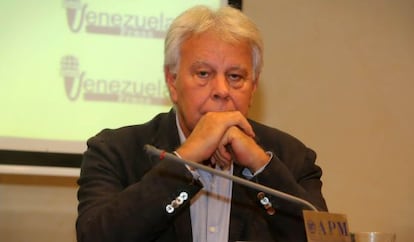Felipe González: “Venezuela is a country heading towards destruction”
Ex-Spanish PM was not permitted to attend hearing of opposition leader during recent visit


Former Spanish prime minister Felipe González could have spoken louder, but his message could not have been clearer. “When you confront a dictatorship, you know what to expect, but not when you confront a betrayed democracy,” the ex-Socialist Party leader said on Thursday during a news conference in Madrid to talk about his visit to Caracas. “Venezuela is the kingdom of arbitrariness and President Maduro is taking the country towards destruction.”
González traveled to the Latin American country last Sunday to advise the defense teams of incarcerated opposition leaders Leopoldo López and Antonio Ledezma. López has started a hunger strike, while Ledezma is under house arrest after undergoing surgery.
Venezuela is a destroyed country in every way, from an economic standpoint and from a security standpoint”
González underlined that the situation in Venezuela was “unsustainable” and that there was “a growing concern throughout Latin America over what is happening. Everyone is worried, except Maduro.”
He continued: “Venezuela is a destroyed country in every way, from an economic standpoint and from a security standpoint. Maduro is the one responsible for this catastrophe in terms of the social and economic crises and [lack of] basic human rights, and there is no willingness for dialogue within the government.
“I have come back very sad and worried. I am worried that such a rich country is walking toward a process of destruction,” he added.
According to the ex-prime minister, the Latin American nation “needs dialogue and reconciliation and for that it needs to restore democracy,” González said. “We have to go to Eastern Europe to find something similar to what I have seen in Venezuela.”
Still, González said he had achieved all the objectives of the visit. “I saw the imprisoned leaders’ families, Antonio Ledezma, [opposition leader] Henrique Capriles, the winner of the Ortega y Gasset prize, Teodoro Petkoff. I met with students. I had a lot of security and I would even say it was more than I needed.”
González’s presence at the press conference, which was held to introduce the Association of Venezuelan Journalists in Spain, turned it into quite an event. Miguel Enrique Otero, the editor and owner of Venezuelan opposition newspaper El Nacional, also attended.
The former prime minister began his remarks by thanking the Venezuelan president for making his visit newsworthy. “Maduro’s clumsiness gave the trip a great deal of impact,” he said.
He also thanked Otero for his work. The Venezuelan government’s number two, Diosdado Cabello, has reported the journalist for reprinting news stories from foreign media outlets about the investigation the United States has launched into him and other Venezuelan officials for alleged drug trafficking and money laundering. “It’s the only free press newspaper printed in Venezuela nowadays,” González said.
Asked why he had left the South American country on Tuesday, less than 48 hours after his arrival, without being granted permission to visit López in the Ramo Verde military prison or attend his court hearing on Wednesday, the ex-prime minister said: “Why should I go running out of that paradise of freedom that is Venezuela?”
Maduro’s clumsiness gave the trip a great deal of impact”
Regarding why he had used a Colombian air force plane to leave the country, González said that he had been able to take advantage of President Juan Manuel Santos’s official plane to travel to the Community of Latin American and Caribbean States (CELAC) conference in Brussels along with him.
In spite of all the roadblocks and obstacles, González said he had come back with the hope that Venezuela would soon hold parliamentary elections, and that he had called on the international community for help. He said that all of Latin America – “whether they say so or not” – was concerned. “Even the Castros see the regime as a hindrance,” González said. He also admitted that he was personally “hurt” to see the situation in which the families of political prisoners find themselves.
Translation: Dyane Jean François
Tu suscripción se está usando en otro dispositivo
¿Quieres añadir otro usuario a tu suscripción?
Si continúas leyendo en este dispositivo, no se podrá leer en el otro.
FlechaTu suscripción se está usando en otro dispositivo y solo puedes acceder a EL PAÍS desde un dispositivo a la vez.
Si quieres compartir tu cuenta, cambia tu suscripción a la modalidad Premium, así podrás añadir otro usuario. Cada uno accederá con su propia cuenta de email, lo que os permitirá personalizar vuestra experiencia en EL PAÍS.
¿Tienes una suscripción de empresa? Accede aquí para contratar más cuentas.
En el caso de no saber quién está usando tu cuenta, te recomendamos cambiar tu contraseña aquí.
Si decides continuar compartiendo tu cuenta, este mensaje se mostrará en tu dispositivo y en el de la otra persona que está usando tu cuenta de forma indefinida, afectando a tu experiencia de lectura. Puedes consultar aquí los términos y condiciones de la suscripción digital.








































